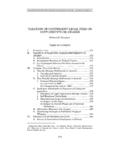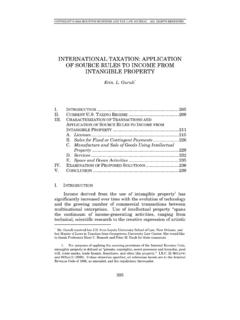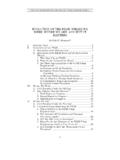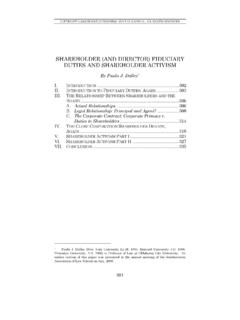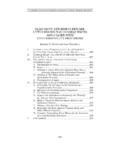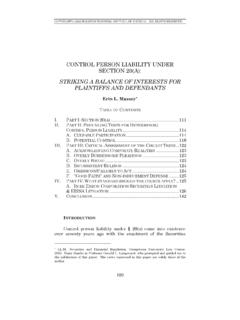Transcription of A GUIDE TO COMMON TAX ISSUES INCIDENT TO …
1 COPYRIGHT 2004 HOUSTON BUSINESS AND TAX LAW JOURNAL. ALL RIGHTS RESERVED. 176 A GUIDE TO COMMON TAX ISSUES INCIDENT TO FILING BUSINESS BANKRUPTCY Paul Asofsky* TABLE OF CONTENTS I. II. Effect of Chapter 11 Filing on Tax Status of a III. Filing of Tax Returns ..178 IV. Payment of V. The Straddle Year ..179 VI. Determination of Prepetition Liabilities ..180 VII. Other functions within the Service ..184 VIII. Jurisdiction of the Bankruptcy IX. Burden of X. Prepetition Tax Refunds ..186 XI. Payment of Prepetition Taxes ..187 XII. Postpetition Interest on Tax I.
2 INTRODUCTION This article sets forth a number of routine tax procedural items of which any company considering bankruptcy filing should be aware. It deals with return filing requirements, the effect of bankruptcy filing on tax audits, the bankruptcy claims resolution process, and the payment of taxes determined in the bankruptcy proceeding. It does not (except perhaps incidentally) touch on substantive tax ISSUES such as discharge of indebtedness and net operating loss carryovers. II. EFFECT OF CHAPTER 11 FILING ON TAX STATUS OF A CORPORATION Upon the filing of a Chapter 11 petition, an entity called the estate comes into being for bankruptcy law purposes, and property of the debtor becomes property of the estate, a * Partner, Weil, Gotshal Harvard Law School, COPYRIGHT 2004 HOUSTON BUSINESS AND TAX LAW JOURNAL.
3 ALL RIGHTS RESERVED. 2004] FILING BUSINESS BANKRUPTCY 177 technical bankruptcy However, this has no effect upon a corporation for tax This rule applies even if a trustee is A number of consequences flow from this continuation of a corporate entity. First, and most important, the taxable year of the corporation does not close on the commencement of the Chapter 11 case. No tax return is required for any short period beginning on the first day of the taxable year and ending with a bankruptcy filing, and the corporation has no election to close its taxable The corporation must await the end of the taxable year and file a tax return in the normal course on the normal due Any consolidated group of which the debtor is a member is not affected.
4 The bankruptcy filing itself does not effect a change in ownership of the debtor, and whether the filing corporation is the COMMON parent or one of its subsidiaries, the affiliated group continues. This follows from the general rule that once a consolidated return is elected, the group must continue to file consolidated returns unless permission to discontinue filing is granted by the Internal Revenue Service (the Service ) based upon good In a number of published and private rulings, the Service has made clear that it will not grant such permission solely on the basis that one or more corporations is in The Service maintains this position even in a case where one or more of the members files a Chapter 7 (liquidation).
5 8 1. 11 541 (2000 ). 2. This is distinguished from the case of an individual, where the creation of an estate for bankruptcy law purposes also creates a separate taxable entity for income tax purposes in Chapter 7 and Chapter 11. See 1398 (2000). 3. See 1399 (2000). 4. As will be seen in a discussion below, there are cases holding that any tax liability for the taxable year must be divided for bankruptcy law purposes between a prepetition component and a postpetition component.
6 See infra p. 5 and note 18. However, even in jurisdictions which adhere to this rule, there is no closing of a taxable year with a consequent duty to file a tax return for a short period. 5. The trustee, if one is appointed, must file the return on behalf of the corporation. 6012(b)(3). If no trustee is appointed and the debtor operates the business as a debtor-in-possession, the debtor-in-possession has the duties of the trustee. 11 1107(a). 6. Treas. Reg. 75(c) (2003). 7. See Rev.
7 Rul. 63 104, 1963 1 172; Priv. Ltr. Rul. 87 13 005 (Dec. 10, 1986); Priv. Ltr. Rul. 84 44 063 (July 31, 1984). 8. See Priv. Ltr. Rul. 84 44 063 (July 31, 1984); Treas. Reg. 75(d) (2003). COPYRIGHT 2004 HOUSTON BUSINESS AND TAX LAW JOURNAL. ALL RIGHTS RESERVED. 178 HOUSTON BUSINESS AND TAX LAW JOURNAL [Vol. IV III. FILING OF TAX RETURNS As will be seen, the debtor should file all of its tax returns of whatever kind in the normal course. In some cases, it might even be advisable to file tax returns or make payments before the returns are actually due.]
8 This might be the case, for example, if trust fund taxes are involved. Most states sales and use tax statutes treat sales taxes collected from customers in the ordinary course of business as trust funds, similar to tax withholdings on employee Responsible corporate officers may be personally liable for these taxes if they are not In a number of cases involving large retailers, state and local taxing authorities have sought to squeeze the debtor corporation into seeking bankruptcy court approval for turnover of collected sales taxes postpetition by pursuing corporate officers for personal Bankruptcy courts probably do not have jurisdiction to prevent states from pursuing officers in this way, regardless of the injustice that ensues.
9 Accordingly, many large retailers with significant trust fund liabilities have paid current and past-due trust fund taxes to appropriate taxing authorities on the eve of bankruptcy to avoid this Other tax returns should be filed in the ordinary course of business even after the bankruptcy has This applies to all federal, state, and local tax returns. IV. PAYMENT OF TAXES The Bankruptcy Code generally distinguishes between prepetition liabilities, , those that arise prior to the filing of the bankruptcy petition, and administrative liabilities, , those that come into existence after the filing of the bankruptcy 9.
10 See, , TEX. TAX CODE ANN. (Vernon 2001). 10. See id. 11. See, , In re Cooley, 166 85 (Bankr. Tex. 1993); In re Rainey, 257 792 (Bankr. Va. 2001). 12. This does not necessarily have to be done. If it is not, the debtor can seek a court order permitting it to pay over the trust fund taxes to the appropriate taxing authority on the ground that these amounts are trust funds and therefore are not property of the estate to be administered by the court. Such an order will usually be issued in the normal course.

